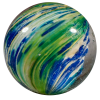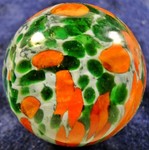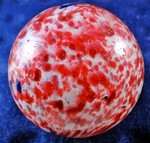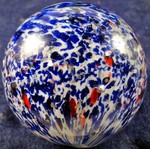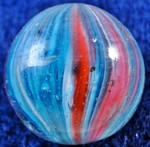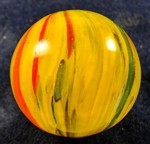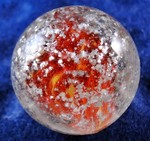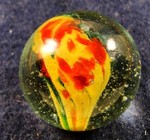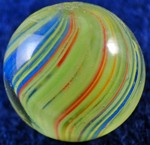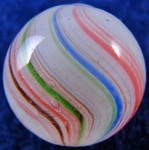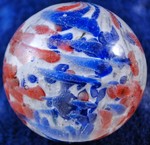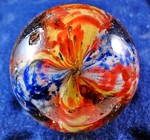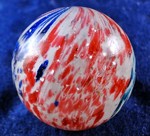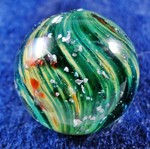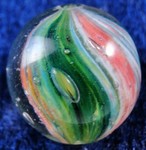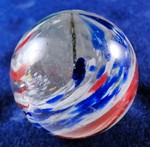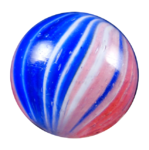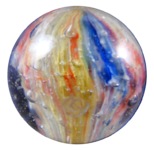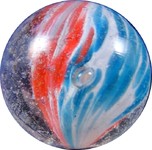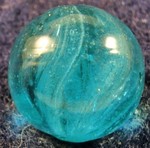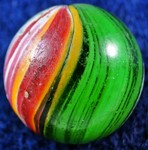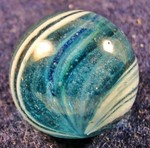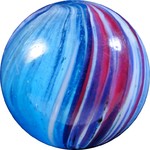END OF DAYS
Cloud
An End of Day Cloud has a transparent base glass, usually clear. The marble can have either a colored base core or no base core. On the core are flecks of colored glass that were not stretched when the marble was drawn off the rod. This is different than an End of Day Onionskin, where the flecks of color did stretch.
Generally, the more colors, the more valuable the marble. Blue or red flecks on a white or yellow background is the most common. Yellow or green flecks, or a different colored background, are rarer. Brightly colored splotches are referred to as Clowns.
Some marbles are left-hand twisted. These are rare, although not as rare as Swirl marbles with a left-hand twist. Marbles with mica are rare, although not as rare as Swirls with mica. Some single-gather single-pontil marbles exist. These are much rarer than cane-cut, although single-pontil clouds seem to be more common than single-pontil onionskins. Lobed marbles are also rare and have been found with three to six lobes, and in this instance are rarer than lobed onionskins.
Click an image to make it full screen.
Onionskin
An End of Day Onionskin has a transparent base glass, usually clear. The marble can have either a colored core or a transparent clear core. On the core are flecks of colored glass that were stretched when the marble was made.
Generally, the base color is white or yellow, and the flecks are red, blue or green. Other colors are rarer.
Some marbles are left-hand twisted. This is rare, although not as rare as in Swirls.
Marbles with mica are also rare, although again not as rare as in swirls. In some cases the mica floats in a thick layer above the core, these are known as Blizzard Onionskins.
Single-gather, single pontil marbles are rarer than is seen with clouds. Lobed marbles have been found with three to eighteen lobes. These are also rare.
Click on any image below to see it in full-screen.
Panelled Cloud/Onionskin
An End of Day Panelled Cloud or Onionskin is a cloud or onionskin that has two or more distinct groups of colors.
The most common have four panels. Two of the panels are stretched red or pink flecks on a white or yellow background, alternating with two panels of green or blue flecks
on the background not used in the first panels. Panels of one colored flecks alternating with panels of different colored flecks, but all on the
same color background are also fairly common. Other color combinations are rarer. About 90% of the panelled onionskins have four panels. Other numbers of panels are
rarer.
Some marbles are left-hand twisted. This is rare, although more common than in swirls. Some marbles have mica, which is rare, and some are single-gather, single-pontil marbles. End of cane marbles are very rare.
Click any image below to see it in full-screen.
Mist
A Mist is a transparent or translucent base with colored flecks of transparent or translucent glass stretched on the surface or just below it. The stretched colors can form bands or can completely cover the marble. However, the colors must be transparent or translucent, so that light shines through the marble.
Usually, the base glass is transparent clear. In some cases, the stretched glass forms panels. Other colored bases exist. These are rarer than the clear base. The outer
layer is usually colored, although examples of a colored base with clear Mist have been found.
Occasionally, there is mica just below the surface of the marble. This is fairly rare.
Click on any image below to see it in full screen.
Submarine
A Submarine is a difficult marble to categorize. They are a cross between an end of day panelled onionskin, an indian, a mist, and a banded swirl.
The base glass is always transparent. It is either clear or colored (usually blue or green). There are two end of day panels of stretched colored flecks on
the surface of the marble. These panels are on opposite sides and usually each covers about one-quarter of the marble. In the two resultant clear panels, there are stretched
colored flecks below the surface of the marble. This creates a multi-layer effect.
Occasionally, there is mica just below the surface of the marble or in the panels or bands of mica, which is even rarer.
These marbles are very rare and very difficult to find.
Click an image below to see it in full screen.


